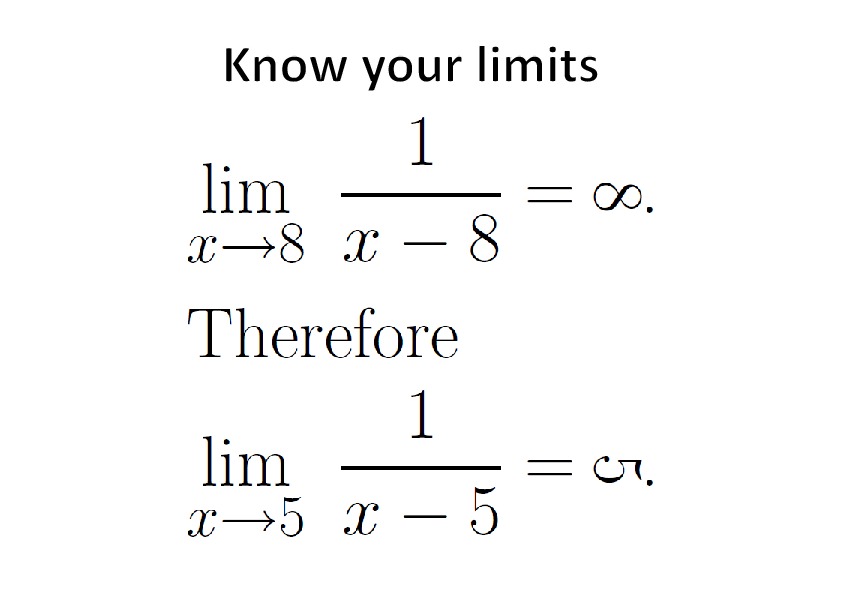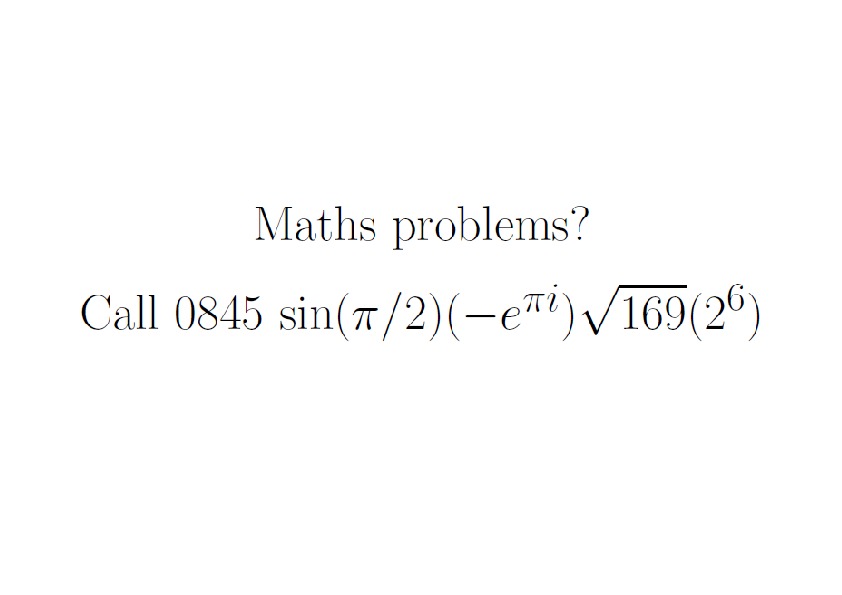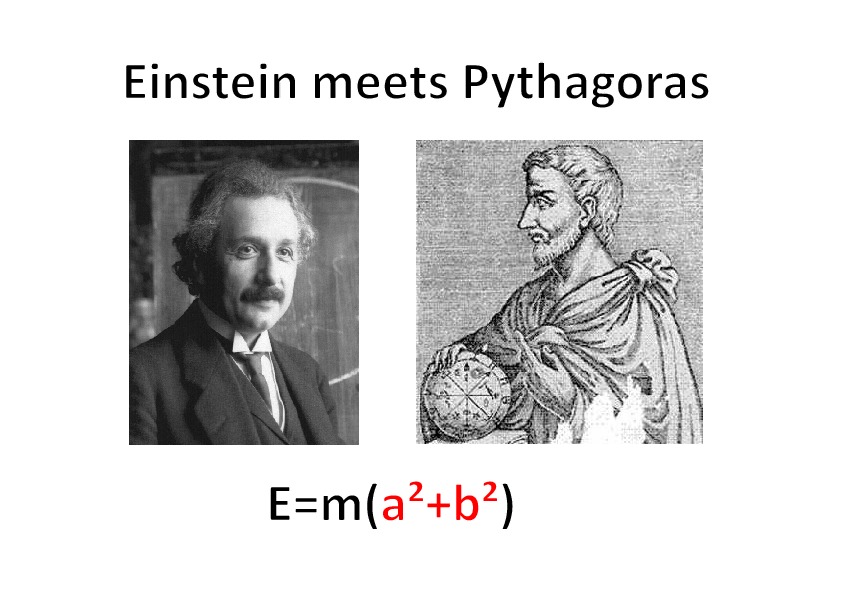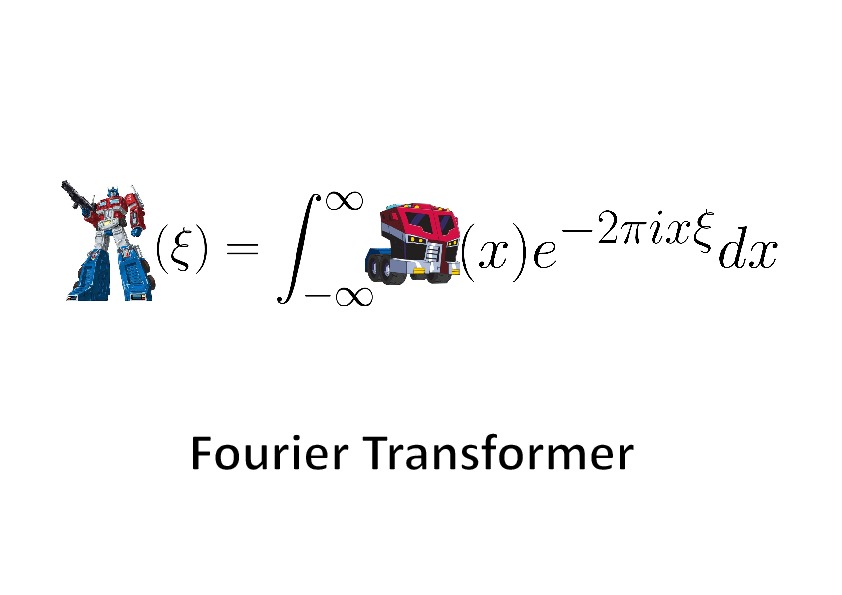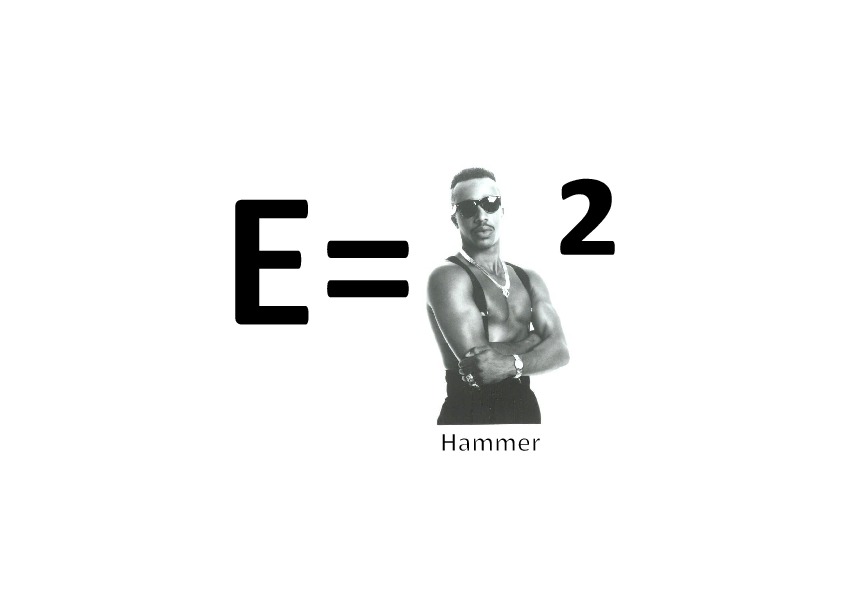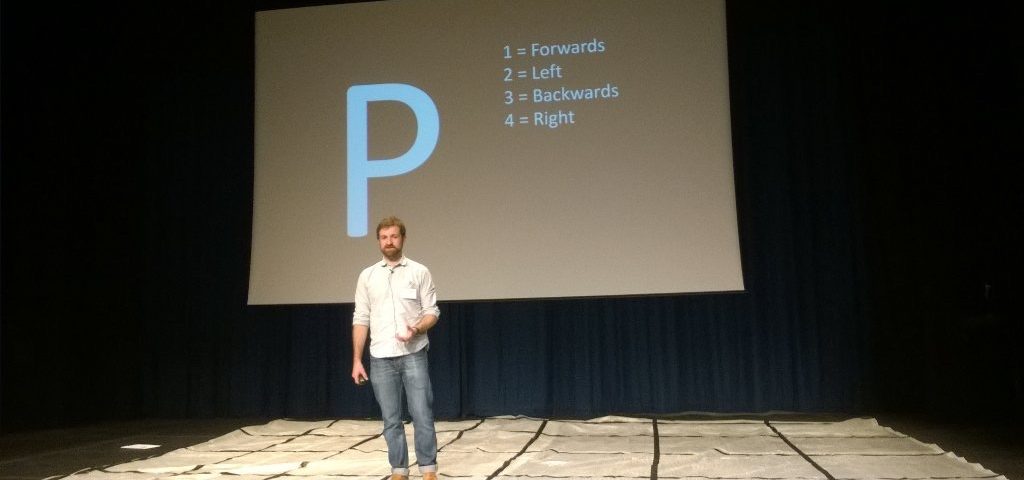I am the widening participation, outreach and engagement officer for the Department of Mathematical Sciences at the University of Bath.
Like many researchers involved with engagement I engage because I think justifying and sharing my work is an important part of my job. I also have a strong belief that it is important to encourage people from all backgrounds to undertake post-18 study (especially in mathematics).
Below you can find some of my engagement and outreach activities.
COVID-19 Pandemic
I am not an expert epidemiologist. I am a mathematical biologists who teaches mathematical epidemiology to undergraduate students. Rather than adding to an already overcrowded field (see Julia Gogg’s excellent article in Nature Reviews Physics) I’ve been trying to communicate some of the ideas around the modelling underlying the decisions we are taking during the COVID-19 pandemic.
TV/Visual
BBC Panorama – Britain’s coronavirus gamble – 20/07/20
Flattening the curve
Doubling Times
Earlier Lockdown
Reaction to Boris Johnson’s Lockdown announcement on BBC World – Outside Source – 04/01/21
Interview with Victoria Derbyshire on BBC one News – 13/04/20
Interview with Tim Wilcox on BBC News Channel – 12/10/20
Interview with Joanna Gosling on the BBC News Channel – 18/11/20
Interview with Shelagh Fogarty on LBC – 01/02/21
Numberphile – Mathematics and Coronavirus
Good Morning Britain with Charlotte Hawkins on vaccines and variants – 08/02/21
Interview with Isabel Webster on Sky News on the subject of border control – 09/01/21
Interview with Nick Quraishi on Sky News – 20/12/20
Interview with Sarah Hewson on Sky News – 16/12/20
Interview with Mark Austin on Sky News – 14/12/20
Interview with Dermot Murnaghan on Sky News – 23/11/20
Interview with Nick Quraishi on Sky News – 15/11/20
Interview with Isabel Webster on Sky News – 12/11/20
Interview with Gamal Fahnbulleh on Sky News – 21/09/20
Interview with Sophy Ridge on Sky News – 07/08/20
The one where I call my own attempts at home schooling ‘half-arsed’ live on national TV.
Interview with Adam Boulton on Sky News – 12/05/20
Interview with Adam Boulton on Sky News – 26/05/20
Interview with Isabel Webster on Sky News – 13/06/20
Interview with Sarah Hewson on Sky News 17/07/20
Interview with Alex Lovell on BBC Points West
RT TV – A second wave of COVID19 in the UK
Radio/Podcasts
BBC Radio 4 – 6 O’clock News – 10/06/20
BBC 5 live Breakfast with Rick Edwards – 30/12/20
BBC 5 live with Mobeen Azhar – 26/12/20
BBC Radio 4 World Tonight interview with James Coomarasamy – 18/12/20
BBC 5 Live Breakfast interview with Krishnan Guru-Murthy – 18/12/20
BBC 5 Live Breakfast interview with Rachel Burden – 11/12/20
BBC 5 Live drive interview with Tony Livesy 08/10/20
BBC 5 Live interview with Stephen Nolan 17/10/20
BBC 5 Live interview with Stephen Nolan 09/01/21
More or Less – 10/02/20 – How much coronavirus is there in the world (from 20:30)?
More or Less – World service – How much coronavirus is there in the world?
More or Less – 02/09/20 – Will the return to universities cause a minimum of 50,000 deaths?
More or Less – 10/06/20 – Were we four weeks behind Italy? Why didn’t we lock down sooner.
More or Less – 29/04/20 – On inferring the date of peak infections from the date of peak deaths.
BBC Crowd Science – On understanding error – 04/05/20
BBC Inside Science – Modelling of Coronavirus – 02/04/20
BBC Inside Science – Coronavirus R number – 14/05/20
Guardian Science podcast – Can we compare different countries – 20/05/20
Numberphile podcast – Gondor calls for aid.
BBC Crowd Science 01/05/20 – How do I learn maths when school’s shut?
Neuro Experience podcast – The Mathematics of Biology & COVID-19
Interview on the BBC world service 18/09/20
Interview with Mark Dolan on Talk Radio 08/10/20
Interview with Phil Chryssikos LBC News
Interview with Ian Collins on Talk Radio afternoon show 23/04/20
Interview with Nigel Farage morning show on LBC – 12/04/20
Interview with Iain Dale evening show on LBC – 07/04/20
Interview with Andrew Castle breakfast show on LBC – 29/03/20
Interview with Iain Dale evening show on LBC – 27/03/20
Sputnick News – Coronavirus ‘Could Take off Again’ if Lockdown Ended Too Soon
All the worlds coronavirus could fit inside a Coke can
I was asked to do a calculation of how much Coronavirus there was in the world by the BBC’s More or Less programme. The story got picked up by a number of news outlets and went global. Here are a few media clippings.
BBC One News
CNN
https://youtu.be/7I22y3dd1VA
Animation of the calculation by Vicki Martin
Articles
Der Speigel (Germany)
My Articles
Huffington post – 07/01/21 – Covid Won’t Go Away Until We Take Control Of Our Borders
Huffington post – 23/12/20 – A Boxing Day Lockdown Will Be Too Late
Huffington post – 10/06/20 – The UK Was Never Four Weeks Behind Italy. How Did ‘Following The Science’ Go So Wrong?
Huffington post – 22/05/20 – Why Didn’t The UK Lockdown Sooner And Prevent Thousands Of Deaths?
The Daily Express – Government’s rabbit in headlights response to COVID-19 has just cost British lives
The Conversation – How to model a pandemic
The Conversation – Coronavirus is growing exponentially – here’s what that really means
The Conversation – Coronavirus: the UK could be over the peak
The Conversation – Coronavirus: is this the moment of maximum risk?
The Conversation – 06/01/21 – Coronavirus: new study claims that a five-day warning ruined the last lockdown
Articles in which I’m quoted
Huffington Post 13/10/20 – Revealed: The 18 NHS Trusts With More Covid Patients In Hospital Than The First Wave
The Telegraph 14/06/20 – Britain’s lockdown model relied on Chinese data showing virus was spreading at half speed
BBC News – 10/06/20 – Coronavirus: ‘Earlier lockdown would have halved death toll’
Huffington Post – 10/06/20 – Should ‘Professor Lockdown’ Share The Blame For The UK’s Slow Response To Covid?
Huffington Post – 29/05/20 – Exclusive: Matt Hancock Faces Second Warning Over Coronavirus Test Figures
Huffington Post – 22/05/20 – Locking Down One Week Earlier Could Have Avoided Thousands Of UK Deaths, Scientists Say
Huffington Post – 22/05/20 – No Drop In Coronavirus ‘R Rate’ As UK Approaches Bank Holiday Weekend
Huffington Post – 22/05/20 – UK Arrivals Breaking Quarantine Could Face £1,000 Fine, As Vaccine Reaches Phase 2 – Here’s The Latest On Covid-19
The Independent – 22/05/20 – ‘Thousands of deaths’ could have been prevented if Tory government had acted one week sooner, scientists say
The Telegraph – 20/05/20 – Earlier lockdown could have prevented three-quarters of UK coronavirus deaths, modelling suggests
Women’s Health/Men’s Health/Esquire – When Will Coronavirus End? We Asked Two Leading Scientists
Wired – Why modelling can’t tell us when the UK’s lockdown will end
Wired – Was Cheltenham a coronavirus super-spreader event?
Newsweek – What Is Coronavirus’ R Number and How Contagious Is COVID-19?
Newsweek – What do R1 and R0 Infection Rate Numbers Mean and How Do They Relate To Coronavirus?
Bristol Live – Did Bath Half Marathon going ahead help spread coronavirus?
The Math(s) of Life and Death
Talks
Royal Instutution – Can we trust Mathematics?
A talk I gave about the book at the Royal Institution in Jan 2020.
Radio/Podcasts
Science Friday – The Maths behind big decision making
Something You should know Podcast – The interesting math of life and death
Radio New Zealand – Maths, a matter of life and death
Research Related
Galton Board
Here are a series of videos I made recently revolving around the Galton Board. We tackle the origins of the normal distribution, regression to the mean and Pascal’s triangle and show how we are related to this wonderful machine.
“The Maths of Life and Death” Pint of Science Talk
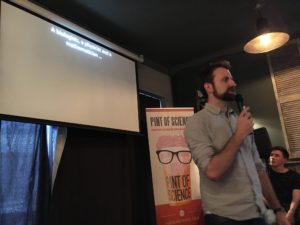
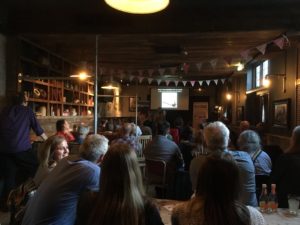
Below is a video of me promoting my talk for Pint of Science Bath in May 2018.
“The Maths of Life” TEDx talk
Here is the TEDx talk I gave in January. It’s a discusion of what mathematical biology is and an example of my own research into the mathematical biology of embryo formation.
Research in the wider media
I recently had my research into locust migration and animal pigmentation patterning covered in the national/international media.
Locusts
I went on BBC radio 4’s Today programme and chatted to John Humphrys about our work demonstrating that locusts must interact with at least two neighbours simultaneously.
Reuters also covered the work in a video piece and I was interviewed for RTE – Ireland’s national broadcaster and the BBC world service amongst others.
You can read my piece about this research on the Conversation website.
Animal pigmentation patterns
Our work on animal pigmentation patterns was published in Nature Communications. A wide range of media outlets ran with the story including Reuters, the Guardian, the Telegraph, the Daily Mail, The Mirror and many others. Reuters also covered our work. You can watch the video below.
I also did interviews on BBC radio Somerset and BBC radio Wiltshire.
You can read my piece about this research on the Conversation website.
Expressions of Research
Over the course of 2016 I collaborated with artist Jean Baynham on a Mathematical Sculpture piece (along side two other researchers from the Department of Mathematical Sciences at the University of Bath). A video of the resulting sculpture piece (and some photos from the private view) can be found here:
You can also hear me talking to Ali Vowles and Jean on BBC radio Bristol about the project here or with accompanying video here:
Conversation pieces
I write articles both about my research and about the applications of mathematics to the real world more generally for The Conversation. My articles have been read over half a million times and reposted by a variety of international news agencies.
How many locusts does it take to start a biblical plague? Just three
How the cat got its coat (and other furry tails)
The maths behind the fastest person on Earth (and no it’s not Usain Bolt)
Why time seems to go by more quickly as we get older
Pourquoi le temps semble filer plus vite avec l’âge (french translation of the above)
A video I recorded about the above articles.
Can disabled athletes outcompete able-bodied athletes?
Five ways ancient India changed the world – with maths
Alan Turing: visionary,war hero and the only choice for the £50 note
Vice-chancellor’s award for public engagement with research 2016
Ignite talks on “What is Mathematical Biology?”
I recently gave a couple of Ignite talks about my research and my subject area more generally. You can watch one of them here:
Sparks podcast
I recently recorded a podcast about my research in Mathematical Biology and the wider subject area, starting with Alan Turing’s brilliant insight into potential mechanisms for pattern formation.
Set for Britain Silver Award
I presented my research on Locusts to MPs and other policy makers at the annual ‘SET for Britain’ national poster competition. I won the Silver award in the Mathematics section of the poster competition with this poster about my research.
Pythagoras’ Trousers podcast
I was recently profiled for the podcast Pythagoras’s Trousers, talking about my research as a mathematical biologist and the field as a whole. You can listen to it below. I kick in at about 7:45.
Watchdog
I recently appeared on Watchdog to talk about the maths of Mortgages.
The Times
I’ve written a few articles for the former Times’ Science magazine Eureka.
The most recent ones are:
A degree of attitude which is about the mathematics behind the Olympic Games.
Truly uplifting which explains the mathematics of flight.
Everything is Mathematical
As part of the launch of a series of books called “Everything is Mathematical” I teamed up with the Times to set a couple of maths problems inspired by real world situations.
The question for my first teaser, about polytunnels, is below:
The solution is here:
The question for my second teaser, about drinking champagne, can watched below:
and the solution is here:
Dara O’Briain’s Scool of Hard Sums
I was one of the chief mathematical consultants for all three series of the innovative comedy/maths fusion programme Dara O’Briain’s Scool of Hard Sums.

As part of the role, I came up with the questions set to Dara and the guest comedians on the show.
I also help devise the Homework questions and was in charge of the development of the Quiz of Hard Sums.
Come and have a go if you think you’re smart enough!
I was also in charge of setting the problems for the advertising campaign which appeared on the radio, on billboards and in the national press.
Bang goes the theory
I recently appeared on the BBC’s flagship science programme Bang Goes the Theory with Dr Yan Wong discussing properties of a special set of curves called the conic sections.
You can watch the whole piece on the BBC website here.
These curves are the shapes made by the rim of a cone when you cut it (see figure below). They have all sorts of practical applications, but I’ll let you watch the video to find out.
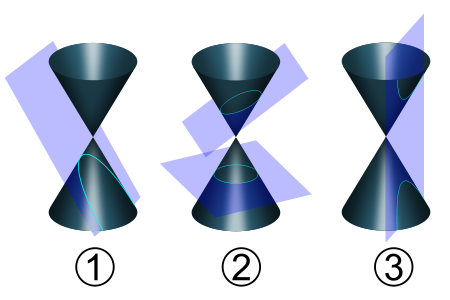
The conic sections, curves in green, are the curves you get when you slice through a cone. They are called (1) the parabola, (2) the ellipse (of which a circle is a special case) and (3) the hyperbola.
Marcus’ Marvellous Mathemagicians

I work with the Oxford University Simonyi Professor for the Public Understanding of Science, Marcus Du Sautoy as part of his ‘Mathemagicians‘ group (M3). We run workshops, activities and give talks about maths to a wide range of audiences.
As part of this group I have had the opportunity to give several high-profile popular maths talks:
- Mathemusica: I gave the opening talk at the Oxfordshire Science Festival on the mathematics of music.
- An ABC of 123: Held at Science Oxford. I gave a short talk on the counterintuitive phenomenon of exponential growth.
- The Winning Streak: We give an interactive work shop (based on Marcus Du Sautoy’s 2006 Royal Institute Christmas lectures) that has toured schools the length and breadth of the country.
STEM ambassador
I am a registered STEM (Science, Technology, Engineering and Mathematics) ambassador. As part of this excellent scheme I do out-reach events in schools, museums and a variety of other interesting places:
- Royal Institution Family Fun day – The mathematics of food: Cutting, weighing and chocolate.
- The Cowley Road Carnival – Wisdom of the crowds and the mathematics of communication.
- Schools out-reach day at St Hugh’s College, Oxford.
- Schools out-reach day at St Gregory the Great school, Oxford.
- Schools out-reach day at University College, Oxford.
WOW! HOW?
I have run a number of events at the Natural History Museum in Oxford as part of the WOW!HOW! event. Usually I demonstrate demonstrated Bernoulli’s principle, that faster moving air has a lower pressure. This has some important results; from keeping planes in the air (air moves faster over the top of the wing and slower underneath creating a “lift force”. I use a really simple demonstration using a household drinking straw and a polystyrene ball (see the picture below).
The air moves faster in the middle of the flow and slower the further away from the centre of the straw you go meaning that the pressure is higher away from the centre of the flow. Every time the ball tries to move away from the centre of the flow is gets pushed back by the higher pressure. Have a go yourself at home!
Bang! science magazine
From April 2010-January 2011 I was a sub-editor on the Oxford University science magazine, Bang! I edit several articles for each issue and write a few as well.
11/2010 – “The domino effect : Teasing out the hidden mathematics of dominos.”
06/2010 – “1,2,3 and away … : Counting to infinity and beyond.”
03/2010 – “The Poetry of Pi.”
Funny Maths Pictures
I created some funny maths pictures for a competition for a few years ago. Whilst I designed these they are not all my original ideas. Please feel to use any of them if you can make use of them. Let me know if you use them for anything interesting.
